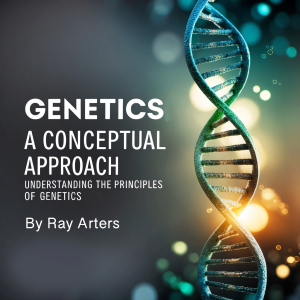

Genetics
Ray Arters
This audiobook is narrated by a digital voice.
Genetics stands as one of the most revolutionary and transformative fields in biology, fundamentally changing our understanding of life, inheritance, and the very nature of biological information. This discipline explores how traits are passed from parents to offspring, how genetic information is stored and expressed, and how variations in genetic material contribute to the diversity of life on Earth. From the molecular mechanisms that govern gene expression to the population-level processes that drive evolution, genetics provides the unifying framework for understanding virtually all biological phenomena.
The story of genetics begins with humanity's ancient observations of heredity, noting that offspring tend to resemble their parents and that certain traits run in families. Agricultural societies have long understood the principles of selective breeding, choosing animals and plants with desirable characteristics to produce improved offspring. However, the scientific foundation of genetics emerged only in the mid-19th century with Gregor Mendel's groundbreaking experiments with pea plants in the monastery gardens of Brno.
Mendel's genius lay not just in his careful experimental design, but in his quantitative approach to studying inheritance patterns. By focusing on discrete, easily observable traits such as flower color and seed shape, and by meticulously counting the offspring in each generation, Mendel was able to discern mathematical patterns that revealed the underlying rules of inheritance. His discovery that traits are inherited as discrete units, now called genes, and that these units maintain their identity across generations, laid the foundation for all subsequent genetic research.
Duration - 44m.
Author - Ray Arters.
Narrator - Digital Voice Archie G.
Published Date - Friday, 24 January 2025.
Copyright - © 2025 Ray Arters ©.
Location:
United States
Description:
This audiobook is narrated by a digital voice. Genetics stands as one of the most revolutionary and transformative fields in biology, fundamentally changing our understanding of life, inheritance, and the very nature of biological information. This discipline explores how traits are passed from parents to offspring, how genetic information is stored and expressed, and how variations in genetic material contribute to the diversity of life on Earth. From the molecular mechanisms that govern gene expression to the population-level processes that drive evolution, genetics provides the unifying framework for understanding virtually all biological phenomena. The story of genetics begins with humanity's ancient observations of heredity, noting that offspring tend to resemble their parents and that certain traits run in families. Agricultural societies have long understood the principles of selective breeding, choosing animals and plants with desirable characteristics to produce improved offspring. However, the scientific foundation of genetics emerged only in the mid-19th century with Gregor Mendel's groundbreaking experiments with pea plants in the monastery gardens of Brno. Mendel's genius lay not just in his careful experimental design, but in his quantitative approach to studying inheritance patterns. By focusing on discrete, easily observable traits such as flower color and seed shape, and by meticulously counting the offspring in each generation, Mendel was able to discern mathematical patterns that revealed the underlying rules of inheritance. His discovery that traits are inherited as discrete units, now called genes, and that these units maintain their identity across generations, laid the foundation for all subsequent genetic research. Duration - 44m. Author - Ray Arters. Narrator - Digital Voice Archie G. Published Date - Friday, 24 January 2025. Copyright - © 2025 Ray Arters ©.
Language:
English
Start
Duration:00:44:07